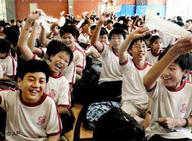 Congratulations, Beijing. Goodbye, surgical masks. As Beijing finally finds itself removed from the World Health Organization travel advisory and blacklists of epidemic areas, we are almost through the protracted ordeal of severe acute respiratory syndrome.
Congratulations, Beijing. Goodbye, surgical masks. As Beijing finally finds itself removed from the World Health Organization travel advisory and blacklists of epidemic areas, we are almost through the protracted ordeal of severe acute respiratory syndrome.
Even Taiwan, one of the latest and hardest-hit areas in China, has seen off the WHO travel alert and is only days away from being removed from the United Nations-affiliated body's list of SARS-affected areas.
This is not only a relief for the Chinese. It is also a great relief for the world as a whole. China's accomplishment in its struggle against the terrible epidemic is a milestone in the international community's fight against the virus.
This is now a time when we can say, with assurance, that SARS is under effective control in this country and that China is now a safe place to be. From today onwards, we hope to see redoubled efforts to make up for the loss we suffered during the past months.
The flu-like disease hit 32 countries and regions around the world, striking a total of 8,459 people. At present, the Canadian city of Toronto and China's Taiwan Province are still on the list of recent local transmissions of SARS.
Millions of Chinese people experienced panic in the early stages of the SARS outbreak because of the unknown nature of the disease. Problems with the inefficient information-sharing system added to the situation, but the central government soon reacted to the outbreak resolutely and effectively.
Many Chinese people can recall the scenes on TV including the bow of tribute Chinese Premier Wen Jiabao made to medical workers, the spring of masks, the animal called the civet cat, and doctors like Zhong Nanshan helping people fight the disease with their knowledge and expertise.
The normal hurly-burly of daily Beijing life has returned with people flocking into the streets and shopping malls again. Anti-SARS campaign signs are still carried by buses, but the retail and catering sectors have recorded a remarkable recovery. The hard-hit tourism industry has drawn up ambitious plans for revival.
Hotels across the city not only can see the light at the end of the tunnel, but also feel they are about to step out of it after the nightmare of the past two months. Room occupancy in a number of star-rated hotels in Beijing nosedived to below 7 percent in April and May, according to the Beijing Tourism Bureau.
"Our rate of room occupancy once dropped to as low as 3 percent in May, but now it has reversed to 30 percent," said Sara Liu, public relations manager with the five-star Great Wall Sheraton Hotel Beijing, whose guests are mostly from overseas.
The hotel has not received any large tour groups from abroad since May, but Liu said they are very optimistic about prospects in the coming days.
Although the city's travel services have taken an increasing number of telephone calls recently inquiring about overseas tours, there have been no such tours since SARS hit the city in late April, said an official with the Exit-Entry Administration under the Ministry of Public Security.
The epidemic infected 5,326 people on the Chinese mainland alone, killing 347 of them. That SARS snowballed into a national epidemic is the result of negligence and belated responses, although we have to recognize that we still know too little about the disease.
The fact that we finally brought it under control and came through it with initial success is because the authorities came to terms with reality before it was too late.
Strong Communist Party and government leadership plus the solidarity shown by the general public in our battle against SARS have convinced us that, united, we Chinese can surmount the hardships and difficulties on our way forward.
With heavy loss of lives, SARS exposed the weakness of our public health system. In a sense, it was a timely warning against the unwarranted complacency stirred up by our recent economic achievements.
With more than 100 SARS patients still struggling in isolation wards in Hong Kong, Taiwan and mainland hospitals, however, any claim of ultimate triumph is premature.
Of the many lessons we learnt from the SARS onslaught, one of the most essential is that vigilance should never be merely optional in the field of epidemic control. The unexpected comeback of SARS in the Canadian city of Toronto was a stern warning against blind optimism.
Vice-Premier and Health Minister Wu Yi stressed that the country learned "lessons with the price of blood", and the anti-SARS measures would be kept in place.
China's emergency prevention and control system for the fight against SARS will be further improved to exercise a regular role, ready for future emergencies. The prevention and control network is being set up in 710,000 villages and 40,000 towns.
China's top legislature, the National People's Congress, was mulling amendments to the law of communicable diseases. The State Council, or the Chinese cabinet, will send 31 inspection teams to all over the country to make a thorough check of readjusted measures and preparations against a possible resurgence of the virus.
SARS has pushed the government into reshuffling our public health system. But we also have to look beyond the sphere of health because there are lots of other holes to plug. SARS told us we are still weak and vulnerable in many respects despite all our progress over the years.
We have to remember the lives lost, remember the tragically high price we paid, and remember that it will do us tremendous good if we learn from our mistakes.
(People's Daily June 25, 2003)
|

